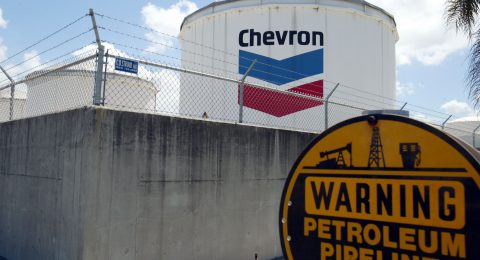U.S. President Barack Obama cleared the way for sanctions aimed at banks in countries that import Iranian oil, the latest U.S. step to ratchet up pressure on the government in Tehran over its nuclear program.
The president determined that world oil supplies are sufficient to proceed with the congressionally mandated sanctions designed to deny Iran income from oil exports, according to a memorandum released by the White House.
“There is a sufficient supply of petroleum and petroleum products from countries other than Iran to permit a significant reduction in the volume of petroleum and petroleum products purchased from Iran by or through foreign financial institutions,” the president said in the memorandum.
Obama cited current global economic conditions, increased production by certain countries, the level of spare capacity and the existence of strategic reserves to reach his decision.
Under a law signed by Obama Dec. 31, banks that settle petroleum-related transactions through Iran’s central bank in any country that has failed to show a “significant reduction” in Iranian oil imports would be cut off from the U.S. banking system. The law requires reductions by June 28 and countries can avoid the sanctions if they take steps by then. The president didn’t set targets for reductions.
Additional Sanctions
The penalties are among dozens of measures adopted by the U.S. and the European Union since November in the standoff with Iran. The EU banned new oil contracts with Iran on Jan. 23 and embargoed all Iranian oil effective July 1. The U.S., Europe and Israel have accused Iran of seeking the capability to build a nuclear weapon. Iran says its program is solely for civilian energy and medical research.
U.S. Secretary of State Hillary Clinton on March 20 granted an initial group of six-month, renewable exemptions from the sanctions to Japan and 10 European Union nations for having detailed plans for curtailing imports of Iranian oil.
China, India, South Korea, Turkey and eight other buyers of Iranian crude haven’t yet made similar pledges. The U.S. is in talks with those nations to reach an agreement before the deadline, according to an administration official who briefed reporters on condition of anonymity. The sanctions were the subject of discussions when Obama was in South Korea earlier this week for a nuclear security summit, the official said.
Monitoring Supplies
Obama was required to make a determination today on whether sanctions can be imposed without roiling oil markets, based on the availability of non-Iranian crude.
“I will closely monitor this situation to assure that the market can continue to accommodate a reduction in purchases of petroleum and petroleum products from Iran,” Obama said in the directive.
The U.S. Energy Information Administration, under the terms of the law, said on Feb. 29 that excluding Iran from the global oil market would widen the gap between worldwide supply and demand six-fold, based on production and consumption estimates. A second EIA report on the availability and price of petroleum produced in countries other than Iran is due April 29.
Guy Caruso, a former head of the EIA under President George W. Bush, said in an interview before Obama’s decision that there would be little effect on gasoline prices because of the sanctions.
Priced In
“It’s already been priced into the market,” said Caruso, who’s now an energy analyst at the Center for Strategic and International Studies, a policy center in Washington.
Crude oil for May delivery settled at $103.02 a barrel on the New York Mercantile Exchange. Prices increased 4.2 percent for the quarter after a gain of 25 percent in the last quarter of 2011.
Iran (OPCRIRAN) is the second biggest producer in the Organization of Petroleum Exporting Countries after Saudi Arabia. It pumped 3.4 million barrels of oil a day this month, the lowest level since June 2002, according to data compiled by Bloomberg News.
With rising fuel prices threatening to crimp the global recovery as Obama faces re-election, the U.S. and its allies have been in discussions about U.S. strategic oil reserves. White House deputy press secretary Josh Earnest repeated today that no decision has been made on tapping the reserve and no proposals have been made to other nations to do so.
French Prime Minister Francois Fillon told France Inter Radio yesterday that the prospects of an accord between the U.S. and Europe on tapping strategic reserves are “good” and consumers can “reasonably expect” a release.
Source: Bloomberg











